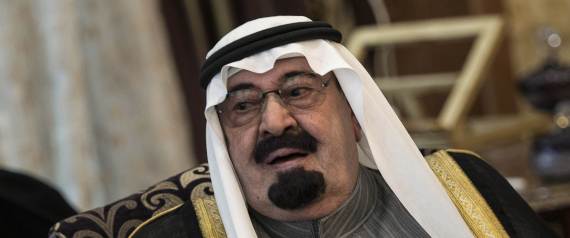
By Jonathan Fahey And Youkyung Lee, The Associated Press
Oil prices rose on news of the death of Saudi Arabia's powerful King Abdullah, but the increase is likely to be short-lived without a cut in the kingdom's immense crude production.
The benchmark U.S. crude futures contract was up 71 cents to $47.02 a barrel at 0725 GMT on Friday. Brent crude, an international benchmark, was up 92 cents to $49.42 a barrel.
The small rise reflects added uncertainty about Saudi oil policy because the country's new absolute monarch, Abdullah's 79-year-old half brother Prince Salman, is in poor health.
"It is necessary to stay watchful about Saudi politics," said Oh Jeong-seok, head of commodity markets at state-run Korea Center for International Finance. "As he is nearly 80 years old and his health isn't in good condition, that itself is uncertain. The price of oil goes up when there is an uncertainty."
Still, the months-long slump in oil prices that is providing a boost to the stumbling world economy is unlikely to reverse unless Saudi Arabia cuts production or world demand starts strengthening again. Some analysts think Saudi production won't be lowered anytime soon because the country wants to maintain its market share.
Oil prices have plummeted nearly 60 per cent since June. Global supplies have soared, thanks partly to a boom in U.S. shale oil production, at a time when growth in global demand for crude has slowed.
Saudi Arabia occupies a unique position in world oil markets. It is one of the world's biggest producers, it has the strongest voice within OPEC as its largest exporter, and it is the only oil producer that has the ability to significantly increase or decrease output in response to changing market conditions.
Despite a big drop in oil revenue, Saudi Arabia has declined to cut production on its own or back a cut by OPEC in an effort to reverse the price decline. The country produced 9.6 million barrels a day in January, according to Platts, the energy information division of McGraw Hill. That's enough to satisfy 11 per cent of global demand.
The question now is whether Abdullah's successor Prince Salman will change the kingdom's oil policy.
Saudi oil minister Ali Al-Naimi has expressed a desire to retire, but he is expected to stay on at least through OPEC's next scheduled meeting, in June.
"Naimi is a market-calming voice, and very well-respected," said Frank Verrastro of the Center for Strategic and International Studies. "Naimi will likely stay on during this period of uncertainty."
Salman's son is the country's deputy oil minister, but Verrastro said it's unlikely he will replace Naimi because Saudi Arabia does not have a history of naming members of the royal family to that position.
Larry Goldstein, a veteran oil adviser at the Energy Policy Research Foundation, said he expects that, if anything, the king's death could delay any decision by Saudi Arabia on whether to cut production or back an OPEC cut. That would help keep oil prices low.
"Continuity and stability is what they will be looking for," he said.
No comments:
Post a Comment